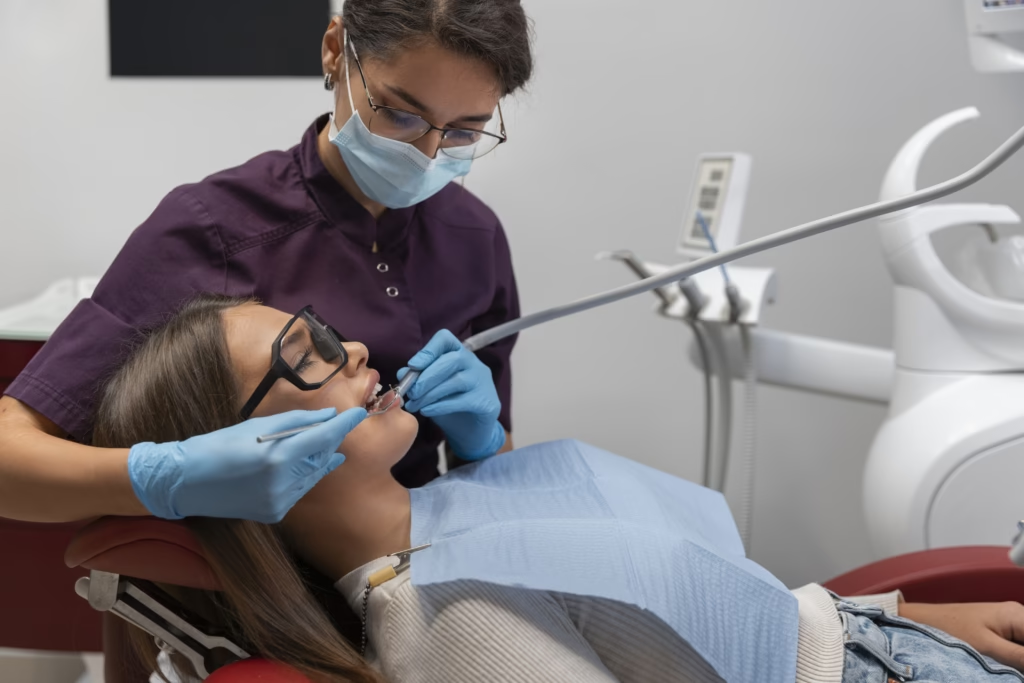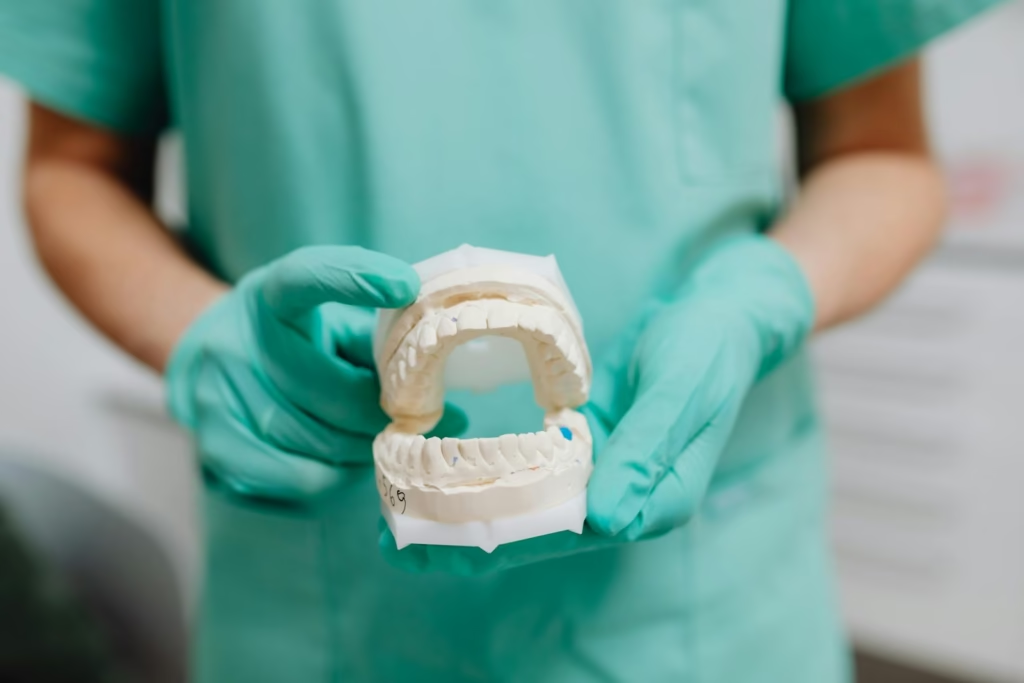Restore Gum Health with Gentle Scaling & Root Planing
Healthy gums are the foundation of a strong, beautiful smile. At Floss & Gloss Dental, our periodontal scaling and root planing treatment helps stop gum disease in its tracks, removing deep-seated plaque and bacteria to protect your teeth and restore your oral health naturally.

What Is Periodontal Scaling & Root Planing?
Periodontal scaling and root planing is a non-surgical treatment for gum disease, also known as deep cleaning. When plaque and tartar build up below the gumline, bacteria begin to infect and damage the supporting tissues around the teeth. Over time, this can lead to gum recession, bone loss, and even tooth loss if left untreated.
This treatment involves two essential steps: scaling, which removes hardened plaque (tartar) from the tooth surfaces and beneath the gums, and root planing, which smooths the root surfaces to help the gums reattach and heal properly. The goal is to stop the infection, allow your gums to recover, and prevent further damage — without the need for surgery.
Trusted by Leading Dental Organizations
We’re proud members of nationally recognized dental associations that uphold the highest standards of patient care and ethics. Our commitment to ongoing education ensures you receive modern, evidence-based treatment every time you visit.





Why Scaling & Root Planing Matters?
Gum disease often develops silently — you might not notice bleeding gums or mild inflammation until it has already progressed. Scaling and root planing helps stop the progression of periodontal disease, restore gum attachment, and reduce inflammation before it leads to tooth loss or bone damage.
The treatment also has broader health benefits. Research links gum disease to systemic conditions like heart disease, diabetes, and respiratory issues. By addressing gum infections early, you’re not only improving your oral health but also protecting your overall well-being.

The Deep Cleaning Process
Scaling and root planing is a straightforward, effective process that can dramatically improve gum health and stop infection before it worsens. Here’s what you can expect at Floss & Gloss Dental.
Evaluation & Diagnosis
Your dentist performs a comprehensive gum exam and may take digital X-rays to assess bone levels and the extent of infection. This helps identify areas requiring deep cleaning.
Local Anesthesia for Comfort
A mild local anesthetic is applied to numb the treated area, ensuring complete comfort throughout the procedure. You’ll remain relaxed while we work below the gumline.
Scaling to Remove Buildup
Using ultrasonic and hand instruments, plaque and tartar are carefully removed from the tooth surfaces and beneath the gums. This eliminates the bacterial colonies causing inflammation.
Root Planing for Smooth Healing
The tooth roots are smoothed to remove rough spots where bacteria could cling. This encourages the gums to reattach tightly, reducing pocket depth and allowing natural healing.



Care You Deserve,
Payments You Can Manage
Everyone deserves a healthy, confident smile — and we make it affordable. Floss & Gloss Dental accepts major insurance plans and offers flexible financing options through CareCredit and other partners. Our team will help you find a payment plan that fits your budget so you never have to delay the care you need.
Frequently Asked Questions
Deep cleaning can sound intimidating, but it’s a simple, highly effective procedure that prevents serious oral health issues. Here’s what patients at Floss & Gloss Dental often ask us.
Is scaling and root planing painful?
Not at all. The procedure is performed under local anesthesia, so you’ll feel no pain during treatment. Some mild tenderness or sensitivity may occur afterward, but it usually subsides within a few days.
How do I know if I need this treatment?
If you have persistent bad breath, bleeding gums, or your dentist notices deep periodontal pockets, you likely need scaling and root planing. Regular dental exams help catch these signs early before damage occurs.
How long does the procedure take?
Depending on the severity of gum disease, treatment may be completed in one or two visits. Each session generally lasts between 45 minutes to an hour per quadrant of your mouth.
What happens after the treatment?
You’ll receive post-care instructions to aid healing, including maintaining excellent oral hygiene and possibly using a prescribed antibacterial rinse. Follow-up visits may be scheduled to monitor your gum recovery.
Can gum disease return after treatment?
It can if oral hygiene lapses. Brushing, flossing, and professional cleanings every 3–4 months are essential to keep bacteria under control and maintain long-term gum health.
EXCELLENTTrustindex verifies that the original source of the review is Google. Edit after 1 year: These people have helped me become the most confident version of myself and have made me feel like family every step of the way🥰 From the extraction, implant, deep cleaning and all the fillings, I’ve had to have a LOT of work done here and I truly couldn’t have chosen a better place to put my trust🙏 Every little worry and question I have is always answered with ultimate patience and the healing process has always gone better than Google/ChatGPT tells me(which means they do CLEAN work) Y’all have earned a lifelong customer in me and I will reassure everyone to have the confidence to get their dental work done because Floss & Gloss will actually take care of you❤️ From the bottom of my heart, thank you Floss & Gloss team for making me feel safe in a part of life that I had the MOST fear of. Now that the anxiety surrounding my oral health is gone, I can’t stop smiling!! My First Review Over a Year Ago: 1st experience at Floss & Gloss left a great impression! I hadn’t been to the dentist as an adult and had 15 years of decay, as well as a bad toothache. I called up there completely clueless and the people at the front desk helped me through every question and concern I could think of, helping me understand the entire process. I’ve never had insurance before and was extremely worried about payment, but they had an out-of-pocket full dental exam option for $79. After calling around to compare prices, I found that this was extremely affordable. The brief “paperwork” was conveniently on my phone and they quickly had me in the back after only 5 minutes of waiting. I was upfront about being unfamiliar with the process, so Fatima happily explained everything in detail while taking my X-rays and teeth pictures. Dr. Patel easily lives up to their reviews, oozing with charisma and genuine care for their patients. They confirmed everything Fatima mentioned noticing from my data and we came up with a treatment plan that was suited to my budget. After being transparent with them about my financial situation, Dr. Patel and the person who discusses payment(sorry I didn’t get your name) were extremely helpful in getting me the best treatment I could personally afford. I can’t stress enough how easy and personable Floss & Gloss made this entire process🙏 I’m not even nervous to come back for my extraction now and I was TERRIFIED before my visit. They made me feel safe, and you really can’t put a price on that❤️ Also, the TVs playing Netflix are going to be real nice while I’m getting work done⭐️⭐️⭐️⭐️⭐️Posted onTrustindex verifies that the original source of the review is Google. Dr. Haviar is amazingggg… I loved how nice and patient he is and very thorough with the work!!Posted onTrustindex verifies that the original source of the review is Google. The staff is amazing, great place to come.Posted onTrustindex verifies that the original source of the review is Google. javier was really gentle, amazing bedside manner, & explained things really wellPosted onTrustindex verifies that the original source of the review is Google. Been coming here for the last 4-5 years. The team does an amazing time! Fatima always assist and make sure I’m comfortable! Dr. Patel is the Best dentist I’ve had! Highly recommend.Posted onTrustindex verifies that the original source of the review is Google. We are with this clinic since 2019 they are very friendly people respectful staff they very patient with kids my kiddos always excited to go there for checkups I wish miss patel the best thank you Fatima for your patience all the staff and finally the two ladies at the receptionPosted onTrustindex verifies that the original source of the review is Google. I had a great experience at Floss and Gloss, the minute I walked in everyone was so friendly and helpful. Tracie was so helpful with the entire treatment plan. Snow and Fatima were our dental assistant and was informative giving all the information on our treatment. I had A04 surgery and they gave my my permanent teeth same day and they are amazing. This is your one stop shop. Thank you floss and gloss for everything.Posted onTrustindex verifies that the original source of the review is Google. Excellent dentist and very friendly staff. Thank you Dr. Nilam!!Posted onTrustindex verifies that the original source of the review is Google. Fatima did a great job on my teeth

